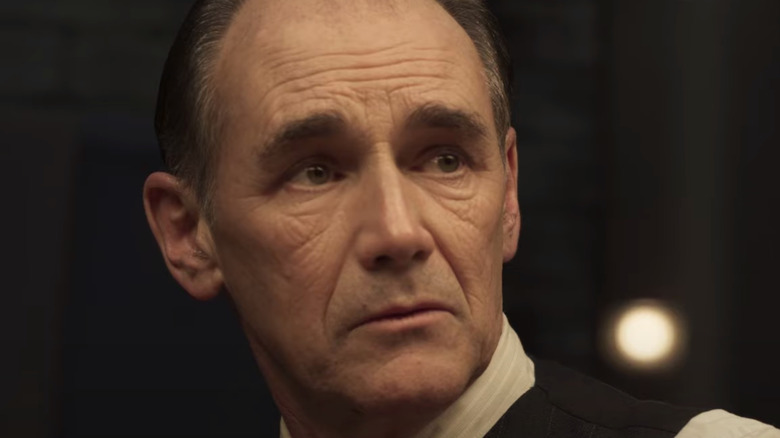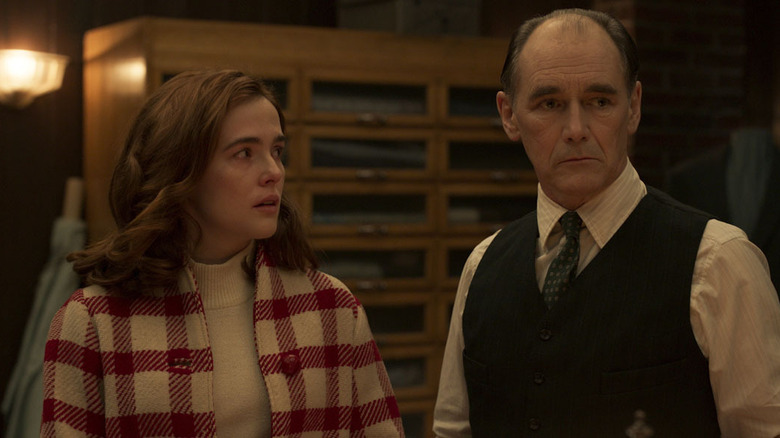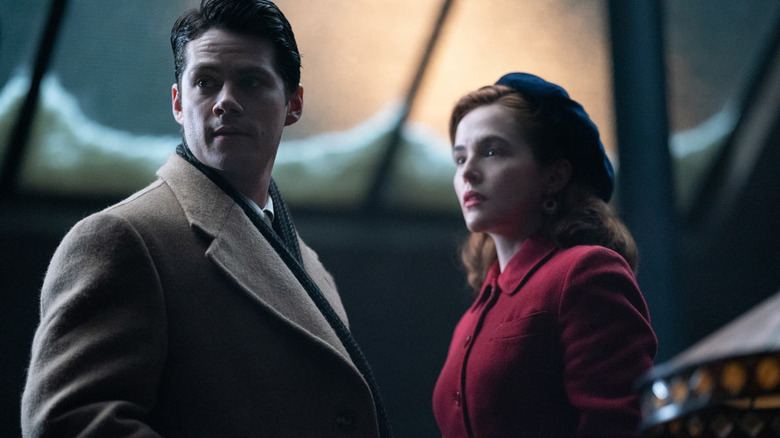The Outfit Review: Tailor Made
From "The Imitation Game" scribe Graham Moore, Mark Rylance's new film "The Outfit" is the perfect showcase for his unique strengths as an actor as well as an underwhelming genre entry that feels, at times, as though it were originally made for television. It's an exemplary marriage of material to performer, to be sure, but there's just something ... lacking.
In the film, Rylance stars as Leonard, a tailor in 1950s Chicago who left his posh gig on Savile Row after World War II. Throughout the film's runtime, this otherwise unremarkable bystander becomes the center of what amounts to a locked room murder mystery full of gangsters who orbit Leonard's shop. Only the audience already knows who has died and how, but must question the information previously presented to them throughout as Leonard's initial mask of innocence and naïveté begins to slip, showing us instead a calculated and resourceful man who may not be as unfamiliar with this world of crime as he presents.
For single locale drama, it's plenty engaging. On a scene to scene basis, it's got enough charm and a talented cast to make it feel interesting. But not long after its credits have rolled, "The Outfit" begins to fade from memory, leaving in its place the vague recollection of having sat through PBS production of some unsung theater piece, or an A&E-produced episode of "Nero Wolfe."
Made from whole cloth
Though the film's core is a largely functioning and engrossing mystery, "The Outfit" isn't, in the end, quite as clever as it seems to think it is. Storytelling often boils down to the artful dissemination of information. What is revealed and how it is revealed is just as pertinent to a tale's construction as what is purposely obfuscated for dramatic effect. In this regard, "The Outfit" relies on a balancing act it doesn't fully pull off.
The film's main thrust depends on the relationship between Leonard (Rylance) and the Boyle crime family, a local cadre of gangsters with whom he has shared a begrudging closeness. Leonard got his start as a cutter on Savile Row, making beautiful tailored suits that became unsustainable commodities in the fallout from the war. He remarks, at multiple times in the film, that it was blue jeans that put him out of business, and that only Chicago's criminal element, with ill-gotten gain to spare, could afford the refinery he is so uniquely capable of providing.
So when Richie (Dylan O'Brien), the son of local boss Roy Boyle (Simon Russell Beale), is mortally wounded in a shootout with a rival gang, his co-conspirator Francis (Johnny Flynn) brings the mob scion to Leonard's shop to be sewn up. But his arrival, alongside a forbidden romance between Richie and Leonard's assistant Mable (Zoey Deutch), and a convenient assemblage of MacGuffins and ticking time bombs, sets into motion a moody, carefully produced chamber piece.
In recent film vernacular, it takes the scene from "John Wick: Chapter 2" where he's getting outfitted with a new suit made with kevlar lining and extrapolates the inherent pun potential between the worlds of tailoring and violent crime. Even its title is a double entendre referencing the national syndicate the Boyle family is but a small franchisee. The inherent menace to the iconography of Leonard's cutter shears slicing through fabric is rife with portent every single time they're employed. But this film is nowhere near as chock full of mayhem.
Though its marketing material suggests something a little more action-packed, its actual construction and pacing call to mind both British kitchen sink dramas, 1940s tommy gun-fueled gangster epics and, most importantly, Alfred Hitchcock's "Rope." Each disparate piece of inspiration is well represented. Both the costume and production design give the film a classical, near timeless look that nonetheless grounds the proceedings into its selected time period. And while it's no "Rope," "The Outfit" wrings a good amount of tension from its setting and pace.
But it somehow fails to synthesize the most alluring elements of its influences into something that stands well on its own, relying solely on its solid photography (courtesy of Mike Leigh stalwart Dick Pope) and the towering presence of its lead actor in Mark Rylance.
A statement piece
Mark Rylance is one of the modern era's finest characters. This is not in question. From his Oscar-winning work in "Bridge of Spies" to his scene stealing turns in films as varied as "Dunkirk" and "Don't Look Up," he's a versatile and supremely gifted performer. So it's no surprise that the best moments in "The Outfit" come from his preternatural ability to make a meal out of a morsel, to wring the absolute most from even the simplest moments.
Some of the most enthralling scenes in the film center around watching Leonard slyly manipulate various supporting cast members, playing them and their obvious insecurities and fears against one another. However, as sharp as he is, he is beset on all sides by lesser talent. That's not to say O'Brien, Deutch, Flynn and others are bad actors, or even necessarily that they're miscast. But there is a chasm between the gentle, thoughtful way Leonard is drawn and the cartoonish stock characters the rest of the cast feel like.
This sort of dichotomy can work well in an actual whodunit, where the idiosyncrasy of the lead detective can make up for every one of the suspects seeming like boilerplate archetypes. because there's a drama in these flatter presences being interrogated from on high by a smarter, more multidimensional figure. Here, though, the film is frequently brought to a screeching halt in the unfortunate transition between the focus on Leonard, and the imperceptible little details of Rylance's performance, and the broad, hackneyed work of his collaborators. It feels like whiplash every time someone else gets to do the talking.
That kind of thespian inconsistency is particularly hard to swallow in a movie that feels this much like someone filming a live theater workshop. Moore's writing and framing all lend the film a quality that suggests he got halfway through developing this idea for the stage, then decided to make it a movie without putting much effort into making it more cinematic than theatrical.
Perhaps as a play, and perhaps with a more well written and well-rounded supporting cast, "The Outfit" would make for a fantastic night at the theater. But as executed, it's merely serviceable as a night out at the cinema.


